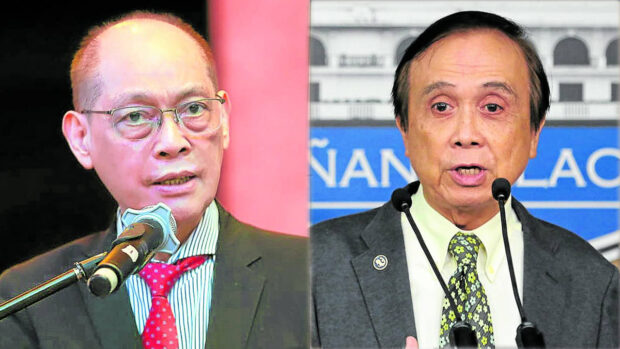UP economists make last-ditch plea vs Maharlika

Finance Secretary Benjamin Diokno and Economic Planning Secretary Ernesto Pernia (FILE PHOTOS)
MANILA, Philippines — With the controversial Maharlika Investment Fund (MIF) bill just a presidential signature away from becoming law, economists from the University of the Philippines (UP) are making an 11th-hour plea to President Ferdinand Marcos Jr. and his economic managers to “seriously reconsider” the measure, which they argued “violates fundamental principles of economics and finance.”
In a 28-page discussion paper titled “Maharlika Investment Fund: Still Beyond Repair” released on Tuesday night, 21 economists and academics from the UP School of Economics, including former Socioeconomic Planning Secretary Ernesto Pernia and dean Ma. Joy Abrenica, said the proposal was “defective,” has “confused goals” and “abound[s] with red flags.”
The economists warned that it posed serious risks to the economy and the public sector “notwithstanding its proponents’ good intentions.”
“We call upon President Marcos to seriously reconsider the final approval of the [MIF] bill, and present before the public a clear and solid rationale for setting it up in the first place,” the group of professors and lecturers said.
“We also call on our former and present colleagues who are now part of the Marcos economic team to reconsider their position on Maharlika and advise the President accordingly, in line with their best appreciation of their discipline and the reservations expressed by the rest of the economics profession of the country,” they added.
Article continues after this advertisementFinance Secretary Benjamin Diokno, who heads the administration’s economic team, is listed as a professor emeritus at the UP School of Economics.
Article continues after this advertisementBudget Secretary Amenah Pangandaman is an alumna, while Secretary Arsenio Balisacan of the National Economic and Development Authority joined the UP economics faculty in 1998 and served as dean in 2010-2012.
Improved safeguards
Defending the MIF bill, Diokno reiterated that it provided the necessary precautions to maintain transparency, accountability, fund integrity, and robust risk management
He said some of the improved safeguards included higher penalties for wrongdoing; well-defined prison terms arising from violations; perpetual disqualification from holding public office for directors, officers, auditors or any person found guilty of the violations under the law, and additional administrative, civil or criminal liability under other statutes.
“The board of directors shall ensure that policies formulated are consistent with the objectives of the [MIF], and the same shall be subject to periodic review,” Diokno added.
“All investment policies approved by the board of the MIC (Maharlika Investment Corp.) shall be posted on its website which shall be immediately updated and made easily accessible to the public,” he noted.
Still, UP’s economists are seeing a potential disaster once it is signed into law.
Among others, the paper’s authors said, the proposed ways of financing the MIF “stand to erode the fiscal situation of the country, beleaguered as it already is.”Last year alone, the Philippines’ account deficit reached its highest level in nearly two decades while its budget deficit exceeded P1.6 trillion.
These “chronic budget and account deficits,” they argued, “mean that the Maharlika fund might worsen rather than abate the country’s fiscal situation.”
With P50 billion of Maharlika’s seed fund coming from taxpayers’ money, the economists warned that it would “surely feed into the deficit and contribute to debt.”
Moreover, they warned that using capital from the state-owned Land Bank of the Philippines and Development Bank of the Philippines “risks destabilizing these institutions.”
Pension funds
While Congress ultimately struck down initial provisions that would have tapped funds from the state’s pension systems for the MIF’s seed money, it remains to be seen whether these funds would not really be used, they noted.
Just last May 31, they pointed out that Mr. Marcos himself floated the idea that the Government Service Insurance System and the Social Security System could still engage with the fund if they wanted to participate in the MIF’s projects.
“This means that the public, through their taxes or pensions, could end up bearing the risk of poor investment decisions,” they warned.
Even more dangerous, they said, the fund “can also be manipulated and politicized by whoever is in power or those connected to them.”
The group noted that the bill also did not have provisions regarding bankruptcy and resolution, which meant that the government “will still shoulder in the end any liabilities or losses that may arise from the [MIF].”
The economists also believed that the current MIF governance structure was “poorly designed, which opens the floodgates for political interference, mismanagement, and corruption.”
Given these flaws, the economists strongly urged Mr. Marcos to weigh again the pros and cons of the MIF and for Congress to explain how they were persuaded by the President to justify the urgency of the legislation.
They lamented that “the preoccupation with this defective proposal” has diverted attention from more vital and urgent national agenda, such as the need to reform the pension system for uniformed personnel.